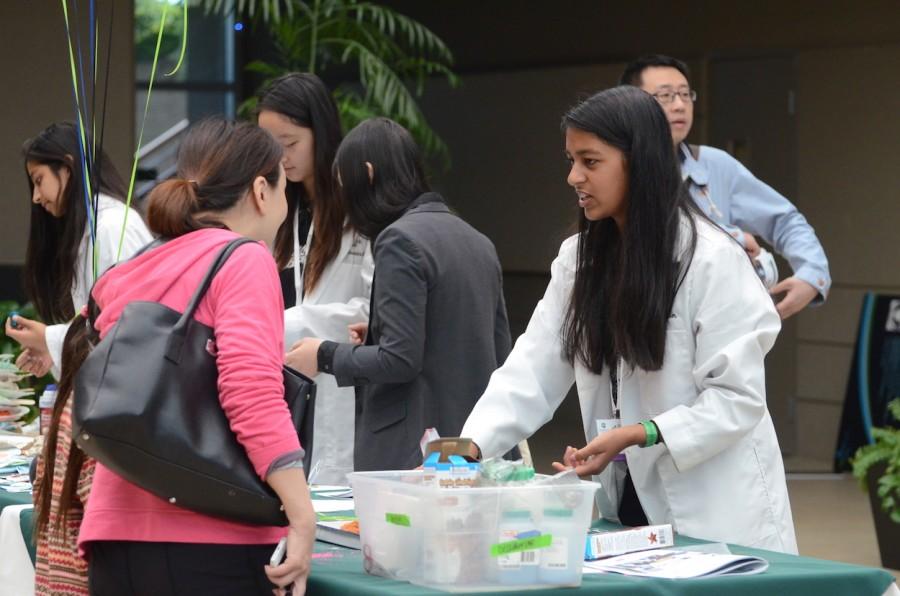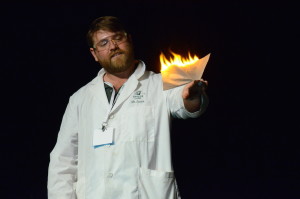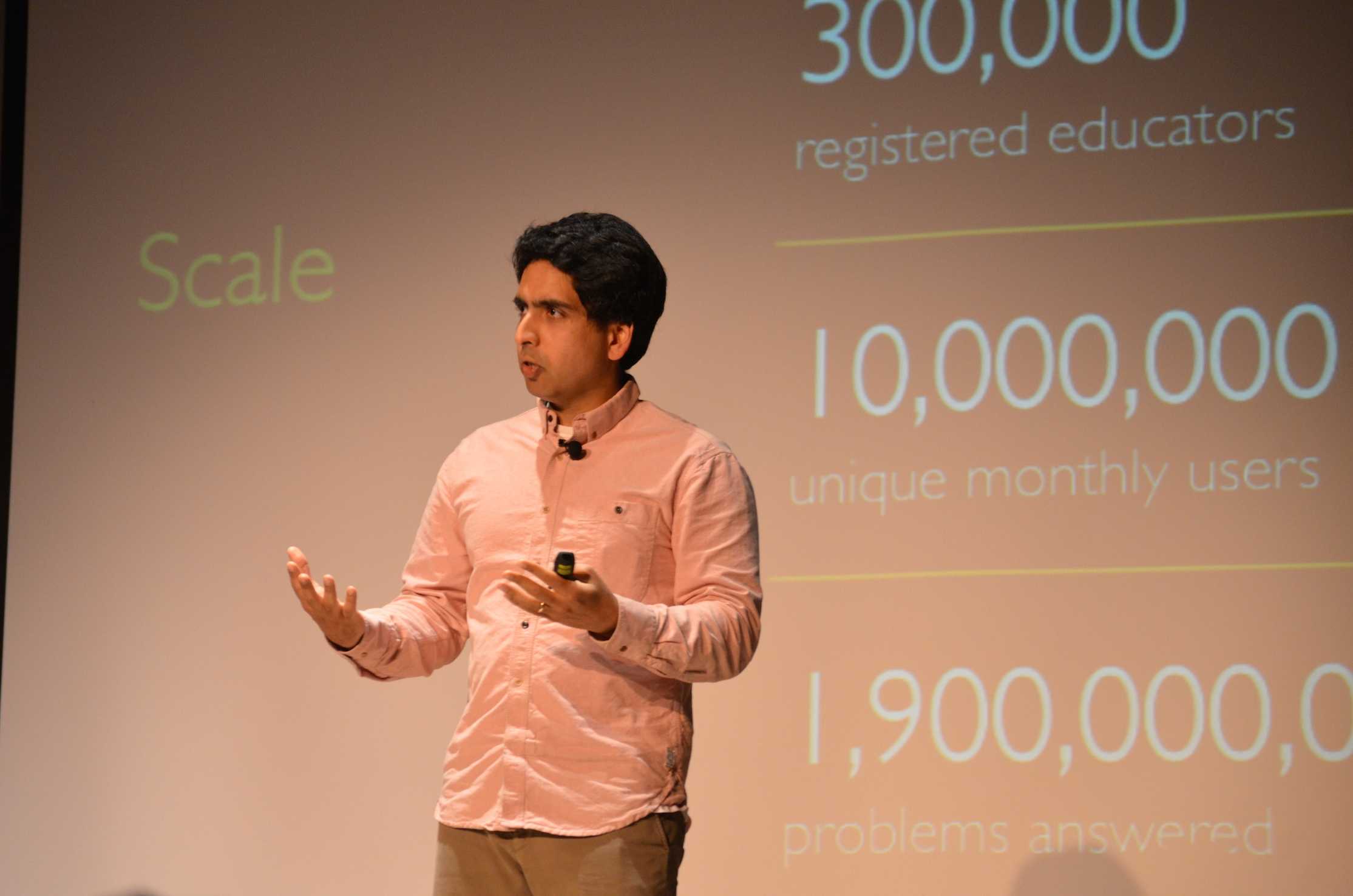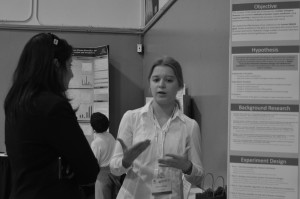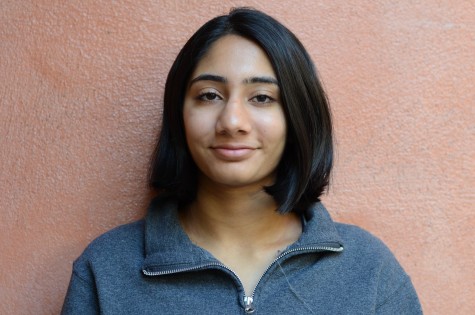WiSTEM hosts 11th annual Research Symposium
Anuva Mittal (11) demos an experiment at the 10th Symposium. This year, WiSTEM will introduce new interactive workshops.
March 25, 2016
The 11th annual Harker research symposium will take place on Saturday, April 9 from 8 a.m. to 5:30 p.m, and will feature science-based student research presentations, formal upper school student talks, keynote speeches, and corporate exhibitions.
In addition to the usual program, the coordinators of the program – biology teacher Anita Chetty and officers of the Women in Science, Technology, Mathematics, and Engineering (WiSTEM) club – will host four science-based research workshops on April 9, two of which are open to high school students.
The workshops are aligned with the theme of this year’s symposium, which is data science, predictive analytics and machine learning.
In the morning, an Introduction to Bioinformatics workshop will take place in which students will analyze biological data, perform genomics searches, examine the human genome and experiment with protein-folding computation. The workshop, run by biomolecular engineer Dr. Marcos Woehrmann, is an hour and a half long and is recommended to students with minimal understanding in biology.
Anita Chetty explained the importance of this course on Bioinformatics.
“If you’re taking a look at predictive analytics, I think it’s really important for us to understand that we can take large volumes of data that are associated with the human genome and be able to use that information in order to be able to predict human health,” she said.
The afternoon workshop is a Make-and-Take Workshop that involves students constructing and customizing their own fully-operating, homemade speaker which they can keep afterwards. This class, led by physics teacher Scott Pflaumer along with upper school physics students, is available to any student interested in the activity, including middle schoolers.
“Learning about it in a textbook is one thing, but actually building your own speaker and seeing how the parts work together is another,” Pflaumer said. “To many people, the speaker is just a black box that produces sound but they have no idea how it works, so hopefully students who come to this workshop will experience building their own speaker and will see how the parts work and how the sciences apply.”
The two-hour machine-learning and predictive analytics workshop is the most technical class offered at the symposium and is instructed by the chief technology officer of LodgIQ, Somnath Banerjee. It is organized for students who have a background in computer programming and wish to develop a deeper proficiency in data science, technology stack, algorithms and data mining and modeling. The workshop is grounded on a set of open source technologies such as Python, I Python, numpy, scikit-learn and Spark.
“The machine learning workshop is going to educate students about the next age of where computer science is going to take us in terms of our own lives,” Chetty said. “It’s going to be a very hands-on opportunity.”
A morning workshop is accessible to the youngest students of the Harker community. It incorporates building a lego robot and entering the final product in a balloon race.
In previous years, those attending symposium could not fully involve themselves in the technical experience due to a lack of interactive elements in the program. Anika Mohindra (12), president of WiSTEM and one of the chief organizers of the symposium, explained how this year’s workshops will add a hands-on approach to the event.
“The workshops are going to add another level to interactivity for the people who attend,” she said. “Students will actually be working hands-on. Otherwise, there are a lot of poster presenters and talks that are speaking to you but not allowing you to immerse yourself in doing some of the work yourself, so this gives you the opportunity to do that.”
This new development is an addition to the symposium program, which already includes keynote addresses, corporate displays and student presentations.
The symposium was coordinated by science teacher Anita Chetty along with members of the Women in Science, Technology, Engineering and Mathematics Club (WiSTEM).
Google, NVIDIA, IBM, Lockheed Martin, Evenium, LodgIQ, PerkinElmer, Prysm and Agilone will promote their companies at the symposium.
Students from eighth grade through high school are allowed to deliver formal talks and poster sessions at the event at certain time intervals between 8 a.m. to 3:35 p.m.


















![“[Building nerf blasters] became this outlet of creativity for me that hasn't been matched by anything else. The process [of] making a build complete to your desire is such a painstakingly difficult process, but I've had to learn from [the skills needed from] soldering to proper painting. There's so many different options for everything, if you think about it, it exists. The best part is [that] if it doesn't exist, you can build it yourself," Ishaan Parate said.](https://harkeraquila.com/wp-content/uploads/2022/08/DSC_8149-900x604.jpg)




![“When I came into high school, I was ready to be a follower. But DECA was a game changer for me. It helped me overcome my fear of public speaking, and it's played such a major role in who I've become today. To be able to successfully lead a chapter of 150 students, an officer team and be one of the upperclassmen I once really admired is something I'm [really] proud of,” Anvitha Tummala ('21) said.](https://harkeraquila.com/wp-content/uploads/2021/07/Screen-Shot-2021-07-25-at-9.50.05-AM-900x594.png)







![“I think getting up in the morning and having a sense of purpose [is exciting]. I think without a certain amount of drive, life is kind of obsolete and mundane, and I think having that every single day is what makes each day unique and kind of makes life exciting,” Neymika Jain (12) said.](https://harkeraquila.com/wp-content/uploads/2017/06/Screen-Shot-2017-06-03-at-4.54.16-PM.png)








![“My slogan is ‘slow feet, don’t eat, and I’m hungry.’ You need to run fast to get where you are–you aren't going to get those championships if you aren't fast,” Angel Cervantes (12) said. “I want to do well in school on my tests and in track and win championships for my team. I live by that, [and] I can do that anywhere: in the classroom or on the field.”](https://harkeraquila.com/wp-content/uploads/2018/06/DSC5146-900x601.jpg)
![“[Volleyball has] taught me how to fall correctly, and another thing it taught is that you don’t have to be the best at something to be good at it. If you just hit the ball in a smart way, then it still scores points and you’re good at it. You could be a background player and still make a much bigger impact on the team than you would think,” Anya Gert (’20) said.](https://harkeraquila.com/wp-content/uploads/2020/06/AnnaGert_JinTuan_HoHPhotoEdited-600x900.jpeg)

![“I'm not nearly there yet, but [my confidence has] definitely been getting better since I was pretty shy and timid coming into Harker my freshman year. I know that there's a lot of people that are really confident in what they do, and I really admire them. Everyone's so driven and that has really pushed me to kind of try to find my own place in high school and be more confident,” Alyssa Huang (’20) said.](https://harkeraquila.com/wp-content/uploads/2020/06/AlyssaHuang_EmilyChen_HoHPhoto-900x749.jpeg)



